#if you weren’t aware it’s probably because no jewish women have brought this up in years due to literally no one giving a single shit soooo
Text
Day 146: Auschwitz

"For ever let this place be a cry of despair and a warning to humanity."
Auschwitz-Birkenau, 1940–1945
This was, without question, the most horrifying, unsettling, and emotionally devastating thing we did on our trip. It was also probably the most important.

We arrived at Auschwitz as part of a big-bus tour group and met our guide. She took us directly into the camp, passing under the iconic sign which, translated, means “work will set you free.”
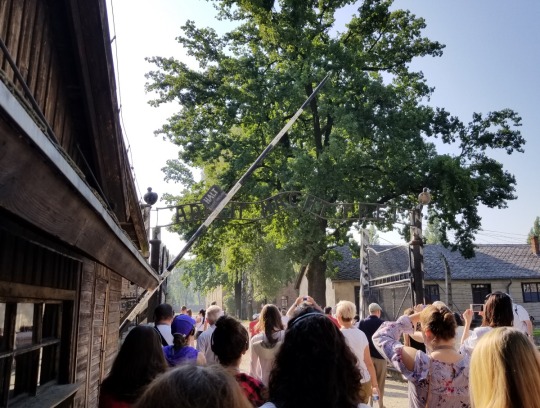

During the Nazi occupation, prisoners were kept in a row of barracks behind barbed wire. My first reaction was surprise at how nice the barracks looked from the outside. The reason is that Auschwitz (or "Oswiecim," in Polish) was originally a Polish military base meant to house Polish soldiers. When the Germans invaded Poland, they needed someplace to store thousands of Polish military and political prisoners. Existing Polish military bases were an obvious and practical solution. All that needed to be done was to add a barbed wire fence and reorient the defenses to face inward instead of outward.


It was later that it became a permanent camp for Jews. It was the perfect location--a rail hub right in the middle of the Nazi concentration camp system.
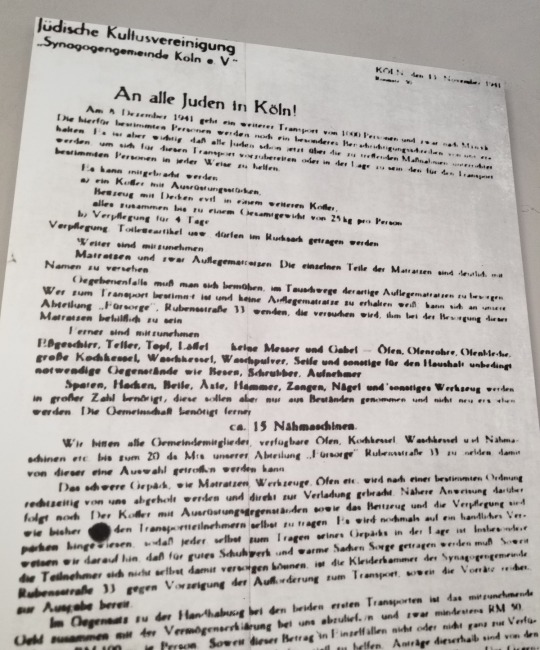
We saw a copy of a Nazi poster encouraging the Jewish population of Cologne to report for relocation to a new settlement where they would be allowed to live in peace.
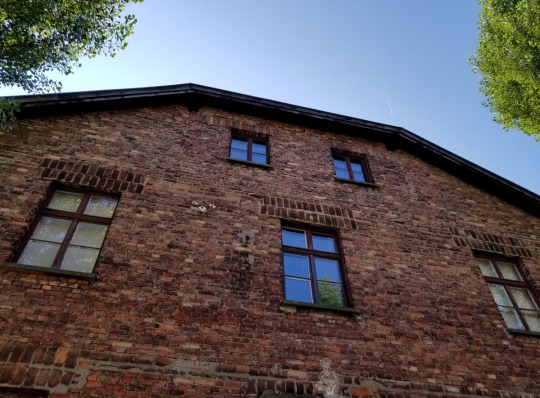

But as decent as the barracks seem from the outside, it is a thin veneer covering a dark core. We saw the insides of several barracks. Most were converted into various exhibits, but we also saw the conditions that the Jews and other prisoners were made to live in–both at the beginning of the camp’s history and at its brutal end.

We saw a barrack filled with items confiscated from the Jewish prisoners. Ever economical, the Nazis kept everything they took from their prisoners with the intention of reusing it. There are whole rooms filled with eyeglasses, hairbrushes, luggage, and even prosthetic limbs.
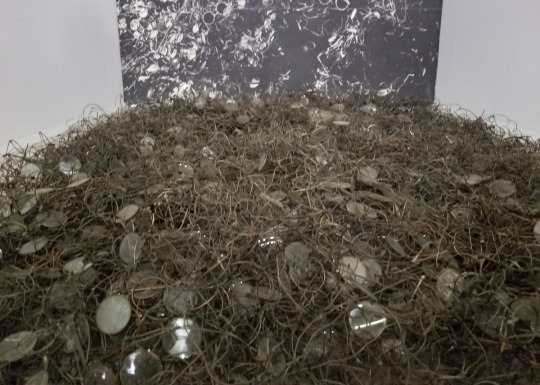

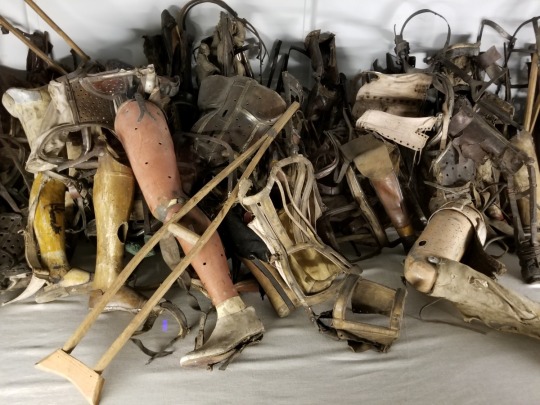
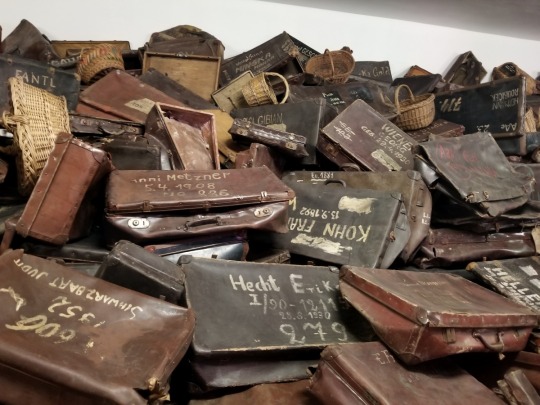
And countless piles of shoes.
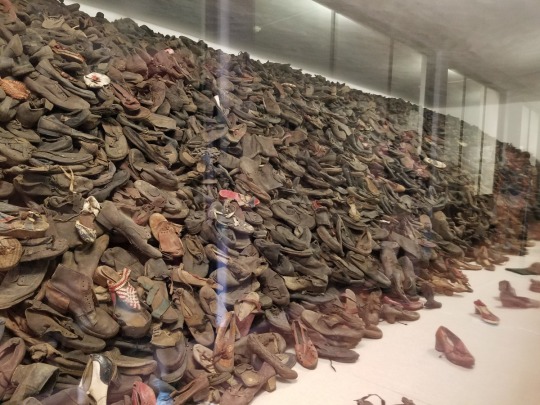
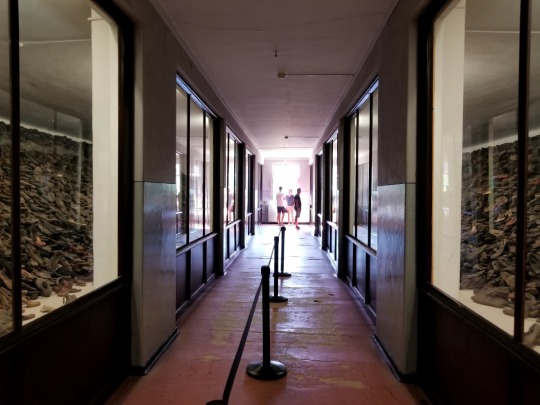
But the room that affected me most was the one filled with hair. Every woman who entered the prison had her hair shaved off. And the Nazis kept it all, intending to use it for insulation, stuffing, and even textiles.
The first thing you see in the room is a small case with a row of braided plaits, cut clean off of their owners heads. They looked as though they might have been cut off that morning. I couldn’t look at them for more than a few seconds before looking away. Seeing them tore at my heart, and it pains me to even recall it now.
And then you turn and see it. A mountain of hair as tall as a person and at least as deep as it is tall, running twenty or thirty yards across the length of the room. Over four thousand pounds of it. Photos aren’t permitted of the hair out of respect, but I don’t think that I would show it to you even if I could.
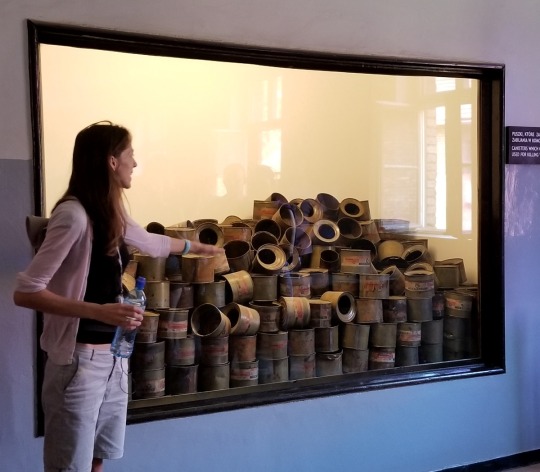

We saw a display case filled with empty cans of Zyklon B, the industrial pesticide that the Nazis used to murder prisoners by the hundreds. It wasn’t chosen because it was fast or clean; it was chosen because it was cheap and readily available. It wasn’t fast, and it wasn’t clean. Many prisoners survived the gas only to be burned alive along with the dead in the crematoria.

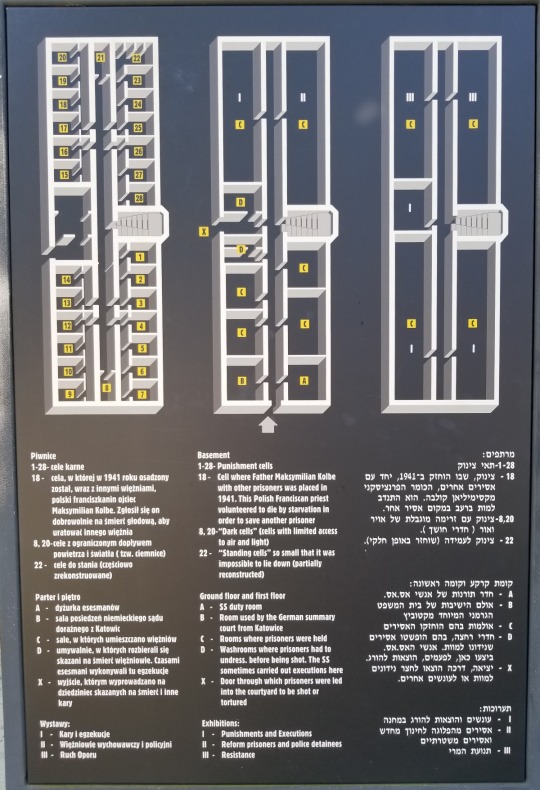
We saw another barrack block that was used as a special prison within the camp--used for disobedient prisoners and anyone the guards felt like making an example of. Some rooms were so crowded and poorly ventilated that the people inside them suffocated. Some rooms were divided into small, unlit standing cells that prisoners had to climb into through a hatch at floor level. I could barely fit into one by myself, but the Nazis would put four men in each. Another set of cells was used for testing various poisons on prisoners until Zyklon B was selected as the one for mass implementation.
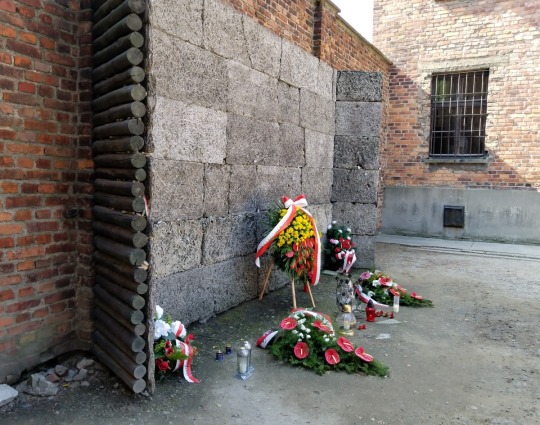

We saw a wall where other disobedient prisoners were summarily shot, and a gallows where twelve Polish Christians were hanged inside the camp for trying to help Jews escape.

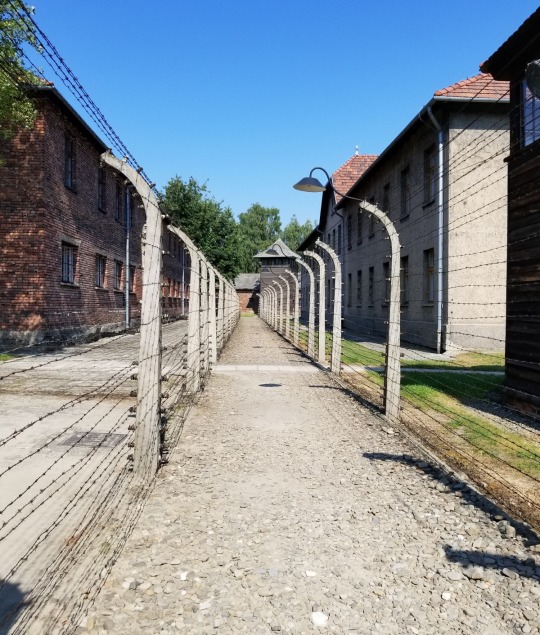
We saw the once-electrified fences that still surround the camp. Built to keep inmates in, it became for some their only means of escape. Many prisoner records ended with “fell against the electric fence,” and no foul play from the guards was involved.
We saw the quarters of the camp commandant Rudolf Hoss, where he and his children would play in their pool while watching the camp prisoners go about their daily work.

And we saw the gallows where Hoss was hanged after the war.

We saw the gas chambers and the furnaces. We saw the room where countless people were murdered, and the holes in the ceiling that carried the agent of their deaths.


We saw the crematorium in the next room with three ovens and a custom-engineered three-track cart system for carrying the bodies from one room to the other as efficiently as possible.


Jessica described her previous experience at Auschwitz as “intense.” I get it now. As we walked around, at first I didn’t feel anything at all. It was too much–numbing. But as we left back under the cursed gate, I could feel myself beginning to shake, with emotions too intense to file away under any pre-existing label.
Absolute horror. Absolute rage. Absolute disgust. Absolute sorrow. Absolute shame–not for any sense of having been a part of it, but for knowing that I am of the same species as the beings who did this.
I wanted this place to be enshrined forever and never forgotten. I wanted it burned out like a festering wound.
At some places we’ve visited, Jessica and I have taken small rocks as tokens of our visit. But when I thought of taking a rock from this place, I felt physically sick. I’m glad I came, but I don’t want any of it to leave with me. I resented even the dust that clung to my shoes.
After a short break, we rode over to Auschwitz II, also known as Birkenau.

Birkenau wasn’t a military base. And it wasn’t a labor camp, either. It was purpose-built for extermination.
One half of the camp is built from bricks taken from the Polish villages that were leveled to make way for the camp. The other half is filled with prefabricated wooden structures. Not even barracks, they were originally designed as stables for German officers’ horses.
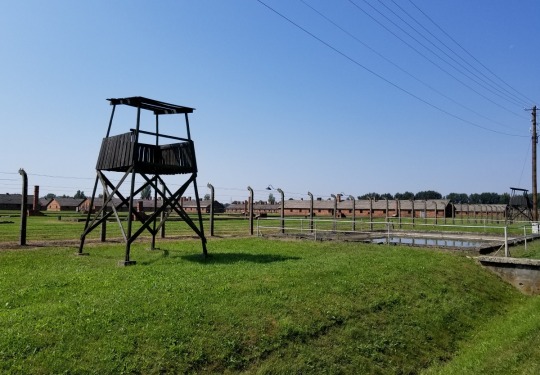
I always found it strange that a camp dedicated purely to extermination would need such a massive amount of living space. The simple, horrible answer is one of massive mathematics.

Ninety percent of all the prisoners brought to the camp were sent directly to the gas chambers . The remaining ten percent were used as slave labor to maintain the camp and run the crematoria. But by the end of the war, that ten percent amounted to over one hundred thousand people.
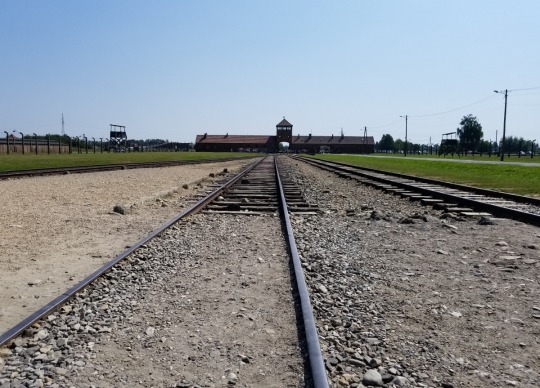
Combined, Auschwitz and Birkenau could kill and burn thousands of people every day. But even that wasn’t enough to keep up with the greater thousands that were shipped by train every day.

We stood on the exact spot where people were divided into those who would die now and those who would die later.
By the end of the war, the gas chambers and ovens weren't enough to keep up with the flood of people being shipped to Auschwitz by the Nazis for disposal. They had to be supplemented by firing squads and mass pyres. But the pyres didn’t burn as efficiently as the ovens, and they left more evidence for the Allies to find when they finally arrived at the camp.
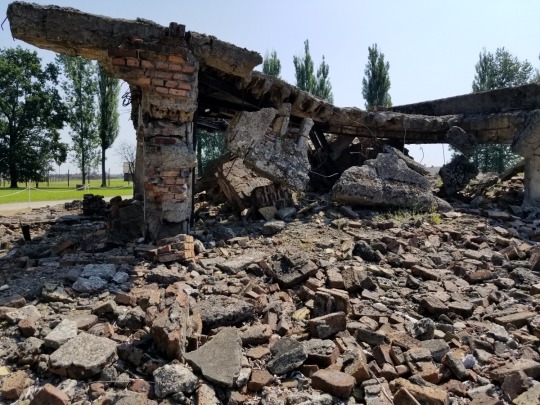


We saw some of the crematoria sites in Birkenau. Before abandoning the camp, the Nazis blew them up in a vain attempt to hide what they had done. They knew exactly what they had done.


Near the crematoria stands a monument to the more than 1 million people who were killed in this single camp complex of Auschwitz-Birkenau.
Back in the living quarters of the camp, we saw a barracks block that was used as an open latrine by the prisoners. We saw another barracks block that was reserved for women who could no longer work, where they were kept under guard until it was their turn to be sent to the crematoria.


Throughout our trip, Jessica and I visited many powerful places. Some positive, some horrible. But every time, I left feeling like I had gained something from the experience. Except Auschwitz.
Auschwitz doesn’t give. It only takes. As we left the Birkenau camp, I felt that something had been ripped out of me–that I was leaving as less than what I was when I went in. I could say it was innocence, or a sense of humanity's inherent goodness. But it wasn't really something that could be summed up as cleanly as that.
Auschwitz is a place of ending. It is the end of the line–both literally and figuratively. It is what happens when an ideology based on fear and superiority over others is taken to its natural conclusion. And while we may have defeated the Third Reich, we haven’t changed human nature. I don't think we ever can.
As long as there are humans, there is the possibility that this could happen again. We can’t defeat it once and for all like in a movie or fairytale. We can only commit to standing vigilant. Words of fear, words of superiority, words that divide the world into us and them–these are the seeds of the next Holocaust. And while we can’t–and shouldn’t–stamp such words out with force, we should treat them with the grim respect that they deserve, lest they flower while we ignore them.
I don’t think I’m a better person for having seen what I saw. But I might have a better awareness of how bad I could become under the wrong circumstances.
That is why I think it is important that these places be preserved in perpetuity, and that anyone who can should see them in person. Not just as a monument to the dead, and certainly not to shame the guilty as if they are monsters set apart from the rest of us, but as a warning to all humans who will ever live that they too are capable of such things.
Next Post: Salt, Cemeteries, and Castles (Krakow, Part II)
Last Post: Schindler’s Factory and St. Mary’s Basilica
2 notes
·
View notes
Note
#11 12 36 42 44 47 50 for my precious baby Credence Barebone
I sincerely hope you weren’t expecting a lot of happiness … 😰
11. Intellectual pursuits?Given his upbringing, it’s most probable that Credence’s intellectual pursuits were heavily limited to Christian teachings. Particularly, the sins, as I theorize that Mary-Lou would have him recite and commit any literature related to them to memory to help enforce a sense of guilt upon the poor boy.If given an opportunity to study something on his own, however, Credence would probably approach fairytales with some hesitancy. They were banned at home for having demonic imagery (the beast from La Belle et la Bete), charlatans (Rumpelstiltskin), and, of course, magic (literally everything). But once Credence starts reading them and observing the intricate illustrations, he gains an insatiable curiosity for them and starts reading more and studying them for their suggested lessons and what they suggest of their respective times of origin.
12. Favorite book genre?Growing up with the New Salemers, he was only allowed to read books serving a Christian ideal. Post-Obscurus Meltdown, however, he’d enjoy fiction and perhaps (magical) reference out of curiosity for his newly uncovered magical self.
36. What makes them feel guilty?It’d be a shorter list to name what doesn’t make him feel guilty. But if you’re looking for specifics, you can start with the idea that he would cause anyone harm by being a burden to them.
42. Hobbies?While with the New Salemers, Mary-Lou would’ve answered for him: Spreading the word of Christ to engulf the unnatural wretches in flames. But if you allowed him time to speak for himself, he probably would need a moment. Most of his life has revolved around New Salem and the church; he hasn’t had much time to himself to develop his own interests. But Post-Meltdown, I think he would enjoy visiting libraries and museums and people-watching in the park.
44. Religion?If you want basics, Christian. But if you want in-depth … Oh, boy.As stated before, I’m not too good with religion. The only thing I can confirm, however, is that Credence and thereby the New Salemers’ branch of Christianity is not Catholic-based. By the time of the story, America’s most recent Great Awakening was the Third, which focused heavily on prohibition and the abolition of slavery, as well as grounded more organizations for women to lead fights again alcoholism, pornography, and prostitution as well as women’s suffrage. We only know Mary-Lou to be for prohibition and the end of obscenity, so we at least know she takes aspects of the Third Great Awakening. Interestingly, however, her demeanor seems more reminiscent of the First, which was noted as being more popular with Methodists and even helped give way to Evangelicalism. And since Evangelicalism seems to root itself firmly in the gospel as a source of salvation, a heavy emphasis on atonement, and missionary work (or spreading the Word), I feel comfortable headcanoning that Credence was raised with Evangelical principles. (However, I also would like to note that a while back I saw a headcanon that Credence was born to a Jewish witch. I personally like this idea as well and extend that I believe that Credence was meant to be Jewish but got raised Evangelical once Mary-Lou took him into her custody.)
47. If they were to fall in love, who (or what) is their ideal?Oooooohhhhhh, this is about to be bitter. According to one (really messed up) experiment involving baby monkeys and two “mothers” (one made of wire but a bottle of formula, and one made of cloth but with no food to offer), the baby monkey will cling to the cloth one as a source of comfort to the point where it will potentially forgo food for as long as possible before taking a quick drink from the “mother” with food. What this controversial experiment wound up suggesting was the extent to which we need the feeling of comfort and love. This experiment further extended to where monkeys were raised in solitary confinement and became severely psychologically damaged to the point of violence when approached by others.How does this all tie in? Because it shows the extent to which a person deprived of affection will go and how a lack of it can effect their better judgement. I personally do not believe Credence was romantically interested in Graves for a multitude of reasons; one of them was the fact that Credence is so wrecked inside that he’d become attached to anyone who shows him kindness. From this POV, we can’t make any safe assumptions about his decisions because his ideal would be so low-standard that it would just mean “someone who won’t hurt me.”If we were to take a freer, more healthy Credence into consideration, however, it would potentially be more optimistic if still with a hint of sadness.Credence’s ideal would still be someone who’s kind, but he needs someone who’s patient with him. He enjoys the quiet people because he’s so nervous, but I don’t think he would mind having a partner who takes charge because he sort of likes the idea of being taken on an adventure since he’s been so coiled up his entire life. He would need someone who’s both physically affectionate, but also mindful of his space and is not afraid to show him how much they care but doesn’t mind that he’s not quite good at it yet.It may not be much, but considering that Credence is still nervous about everything, he needs to take some time out for himself and develop that image a bit more.
50. Is this person afraid of dying? Why or why not?Yes. Credence strikes me as the sort of person who doesn’t want to die, but is also scared of what his existence experiences next. He can’t be comforted by the idea of an afterlife because Mary-Lou put it in him that he’d probably end up in Hell because he’s a disobedient burden. Furthermore, he’s now very much aware that he’s magic, which he’s been brought up to see as a big no-no even if he has a better understanding of it now. He may think that because he used his magic for harm, that he’s sealed the deal and damned himself. He’s scared of how much more he can take, but he wants to continue living if only to redeem himself and start anew. Because dammit, Credence deserves better!
#credence barebone imagine#credence barebone imagines#credence barebone headcanon#credence barebone headcanons#fantastic beasts imagines#fantastic beasts imagine#fantastic beasts headcanon#fantastic beasts headcanons#regrettablewritings#credence deserved better!!!
46 notes
·
View notes
Text
Book 16/2017 - Look who’s back by Timur Vermes
I think I might just start with the ending. Because it’s creepy as fuck and it perfectly captures the atmosphere that this book has built up over the past 400 pages. And because I’ve heard those words before, in real life, which makes it so much mure realistic and so much more terrifying. It goes like this (in my inexpert translation, because it’s a German book):
I could now use the momentum of publishing a book and broadcasting a new TV show to start a propaganda offensive and then found a social movement. My publisher has already sent me some designs for posters [...]. I like them. I really like them. The slogan reads:
“It wasn’t all bad.”
I can work with that.
Those are the last words of Adolf Hitler after 400 pages of inner monologue during which he is resurrected in Berlin in 2011 and then proceeds to once again win the hearts and minds of millions of Germans by ways of a media landscape ever hungrier for clicks. The book ends with him in the hospital, recovering from an attack by neonazis (who think he’s Jewish, ironically... Not even they realize he’s the real deal, although he’s as unapologetic as ever), getting calls from all the major parties in Germany, a book publisher and various media outlets - and just leaves it at that. No epilogue, no comment on how the story continues, on how he’s finally brought low because someone must have noticed, someone must have seen the signs, someone must have recognized the abyss looming behind his words - only no one has. And worse, no one will. Because just like last time, in spite of his machinations, he has been nothing but straightforward with his intentions and worldview. It’s just that no one takes him seriously. Just like last time. I guess this is why there’s such an open ending: the author doesn’t need to be any more explicit. Everyone who picked up this book and read it already knows where it’s going. Maybe not with the war, because the international climate has changed during the last 70 years, but the rest? It sure seems like it.
It’s actually kinda funny. There’s this huge contrast between the story itself, which is incredibly realistic, and the beginning, which isn’t realistic at all. This is not supposed to be a critique, I love fantasy and science fiction and all that, so I obviously don’t mind unrealistic events as long as they are logical in the universe they take place in. Admittedly this particular beginning doesn’t make much sense in the universe it takes place in either, which seems to be ours without any magical or scientific upgrades, but in this case, for the sake of contrast, it’s okay. The book starts with Hitler waking up on some kind of yard in the middle of Berlin, where his bunker used to be. Just like that - no explanations, no justifications, no similar events with other people, it just stands there like a run-down shack wedged between skyscrapers. This wildly unrealistic event gets handed to you on the very first page, and maybe it makes you believe that this is some kind of alternate universe thing, or some dystopian thing, or science fiction - something that doesn’t directly apply to us human beings living in a universe where things like that don’t happen - but this story is not any of those. From then on it gets awfully realistic, because we all know how TV shows work, we all know how twitter and youtube work, and we all know that we usually don’t see things as they are, but as we are, to borrow from Anais Nin - which means that we hear what we want and expect to hear, and just ignore, misinterpret and excuse all the rest.
I just realized that I make this book appear more sinister than it is. It’s very, very creepy, yes, but that alone doesn’t do the book or the author justice because it’s also so funny! That really doesn’t happen often, but I laughed out loud a few times while reading it, and this was my second time through, so the jokes weren’t even new. Some situations are just so absurd (and luckily innocent enough to laugh about), like when he constantly spells modern names like Mandy (Menndi), Cindy (Sinndi) or handy (the German word for mobile phone = Henndi) wrong in his head, or when he’s absolutely convinced that elderly women who pick up their dogs’ poop with plastic bags are mentally ill. Sometimes it’s so funny I even forgot whose inner monologue you’re listening to, which is terrifying in and of itself, and most times I couldn’t decide whether to roll on the floor laughing or run around outside screaming with terror. Spoiler, I went with laughing and ignored the other urges. How very human of me. But this paradox is great, actually, I think the humorous part is what really hammers the message home: For all our engaging with our past and looking for wrong turns and swearing that something like Hitler will never happen again, we are not safe. And we won’t ever be, which is why we will always have to be on the lookout for people like him, for rhetoric like his, for patterns like 80, 90 years ago.
I’m talking mainly Germany here because I’m German and I know German society best, but we’re not the only ones who have experienced populist and exclusive dictatorian regimes rise to power, and especially these days we all need to be extra attentive. The people that Hitler interacts with are mostly not even stupid uneducated and exploited, but reasonably successful and sometimes even university graduates (so here’s to stereotypes of your typical neonazi) and they still support and enable him. Because they profit off him, because they think they can contain him, because they ignore the parts about him that make them uneasy. Point is, they’re not safe from his charisma in spite of 16 years of education, give or take, because he doesn’t look like a monster but like a guy with a slightly antiquated vocabulary and a weird thing for old suits who happens to have a baffling resemblance to, but none of the monstrosity of the person they’ve been taught to fear. At least not with regard to manners and behaviour, which is all that seems to matter. What he says is not all that important, then, and obviously he can’t mean everything literally because of course we’re way past that dark chapter in our history - only that apparently we’re still vulnerable, and it’s enough that he puts on a normal-looking suit instead of a military uniform to get our attention (which he full well knows). He doesn’t even have to lie, his misanthropic worldview is just as much out in the open as it was back then. And I’m thoroughly creeped out by how realistic this is presented in this book, especially with regards to the US where the current president boasted during his campaign that he could shoot someone on Fifth Avenue and still get away with it. Because I guess he could, if not juridically then at least in the eyes of his followers, which is all that matters, in the end. He’s said awful things during his campaign and done/tried to do awful things during his presidency, and it does not matter. I know you can’t directly compare the two without devaluing and ignoring the millions of lives Hitler destroyed, but... the pattern is there.
I’m sorry, I’m ranting, and I’m not even sure this makes much sense any more, but I’m getting... passionate, one might call it. For the lessons it contains I’d definitely recommend this book, but I’m not sure how understandable it is for someone who doesn’t speak German and doesn’t know the society and political system here. There’s a lot of inside jokes and references which probably don’t make sense without footnotes and/or some thorough research, and I honestly pity all those translators who’ve tried to get the language of this book across in another language. Because the writing is superb. The dialogues feel realistic, all the main characters have distinctive speech patterns including dialects and local expressions, and Hitler’s inner monologue itself feels incredibly authentic. I can’t imagine the amount of research that must have gone into this story. But I’m so glad that Timur Vermes put in all this work, and I’m so glad that it was very successful in Germany and abroad, because it raises awareness in an entertaining way and asks important questions about society, the media, and how the human race just never seems to learn from history.
7 notes
·
View notes
Text
Remarks about my writing Grell as Jewish
Firstly, I am not Jewish.
I’m not Christian either, and in fact am Muslim. So I understand the feeling of belonging to a marginalized faith, and underrepresented or misrepresented faith, a demonized faith, probably a lot better than most Western Christians would, and so I come with that background. I also know many people of the Jewish faith, religious and non-religious.
But I am not Jewish. Nor do I claim to understand at all the Jewish experience.
So why would I dare headcanon a London serial killer as Jewish? Let me explain--
Firstly, I not only warn you, but ask for forgiveness, in making my decision solely based upon analytical patterns and tropes of Jewish characters throughout history, without at all considering the ramifications of enforcing stereotypes, of demonizing a people. I ask for forgiveness for originally using the faith as a plaything for dress-up for my little shitty fanfiction, entirely forgetting that Judaism is not only a very real and very deep faith, but that antisemitism is still alive and well.
So here goes my original decision making process--
I had been reading up a lot on Jack the Ripper’s history, mainly because I wished to start my own project involving the subject matter, and had found some interesting bouts of historical antisemitism throughout. Forgive my naivety, but they don’t really teach this sorta shit in American schools, the fact that antisemitism originated and existed before the Holocaust. I was dimly aware, having toured many European nations and recalling remarks that tour guides made about certain architectural choices due to historical antisemitism, and having read one book by accident that was a series of monologues from documented middle-ages life stories, several of the monologues dealing with historical antisemitism. But somehow it never all came together than in 19th century London, anti-Jewish attitudes were a thing, until I researched, and I became fascinated by this strange stereotype--that Jack the Ripper must have been Jewish because only Jews could be capable of such savagery. It was weird to me, never having considered Jewish persons to be anything outside of heavily involved in musical theater, and it reminded me of the stereotypes facing my own people, Muslims, of us being bombers and rapists capable of savagery.
And knowing that the name “Grell” was a German name, it got me wondering--a German Jew?
It was a smaller headcanon of mine, where I somehow kept going “ah yay, representation!” in my head without understanding the ramifications of negative representation.
But it only ran deeper when I was introduced to Judaism in Shakespeare and other English literature. I learned of Shakespeare’s Shylock, of Dickens’s Fagin, their wickedness in English society. Thieving, maniacal, malevolent, melodramatic, and--Jewish?
I couldn’t help but be brought back to cartoons I had seen of my own people, with big white turbans and big, thick beards, holding guns with dumb looks on their faces as they held goats in their arms and addressed them as “wives”. I thought of Ahmed the Dead Terrorist, of The Dictator, of Tintin and the Land of Black Gold, of Homeland, of American Sniper, of Raiders of the Lost Ark, of Call of Duty, and couldn’t help but wonder if Grell had been handled by a Victorian English author, would he have been coded as Jewish?
What really was the kicker was this article, this article, and this article, that made me adopt wholeheartedly the idea that Grell, in a Victorian-English context, would have been coded and Jewish, as there have been depictions or written remarks throughout all of history of Judas, David, and Esau having red hair. Due to this, in literature throughout history, red hair has been an identifier of malevolence, of hot-headedness, and of Jewishness. Both Shylock and Fagin were often depicted with red hair, after all, Grell only doubly so.
So my conclusion, in the end, is that a case can be made for coding Grell as Jewish--
Unfortunately, that is not the conclusion of this post...
Recall my earlier apology?
In my research and soul-searching of Jewish stereotypes, relating them to the Muslim stereotypes I know so well--I had forgotten about how much those stereotypes hurt. Perhaps it is the Muslims who are now being depicted as big-nosed and hairy, rather than the Jews, but it wasn’t too long ago that the Jews were where my people are today. Not only was it not that long ago, but even the slaughter of my people is under the guise that these are “Islamic terrorists”-- “terrorist” being the keyword that defends Islamophobes, making the rape of the Muslim world seem justified. Jews weren’t even afforded this title of “terrorist” or anything of the like, the word “Jew” alone being bad enough as far as I am aware.
So now I must finish my apology--I am sorry for neglecting the fact that writing a serial killer known for his savagery and brutality as Jewish, especially a serial killer from a time period where such traits were ascribed the Jews, is highly offensive and misrepresentative of the Jewish community. It’s as bad as the stereotype of the brown, grinning, sooty-eyed, fang-toothed Arab Muslim sheikh, leering over young maidens as he puffs on a thick cigar bought with blood money. It’s as bad as the black as night, absurdly strong savage warrior, who dons a loincloth of leopard print and prowls the land as some half-human, half-animal hybrid. It’s as bad as the thick-lensed, creepy, mathematically inclined Asian who speaks in a high, effeminate stutter and masturbates to animated women.
But I am not taking down the headcanon--and here is why.
I wish instead to make Judaism less a cause of his savagery and cunning, and more a simple trait. Grell Sutcliff is the savage Jack the Ripper, but is also the brilliant engineer, the talented singer, the queer, and the born and raised Jew.
I choose instead of reinforcing Jewish stereotypes, to research and respects customs and cultural traditions, and to use faith as moments of the split from savage animal to a ponderous human, who recalls the hymns his mother sang to him--Hine Ma Tov and Oseh Shalom--in moments when he almost reaches humanity. For psychopathy is not raised in a vacuum, and religion is not taught only to the righteous. Grell will never be excused of his actions nor his perverse worldview, but a human being, even a psychopath is not simply made up of their perversions. There are multiple facets to each human being.
I know it’s hard to swallow, that serial killers are indeed human, even if their actions and perversions are not deserving of such a distinction. There is no humanity in their actions, as they are unimaginably cruel, but they were born from a mother and father, sometimes even raised by said mother and father or other guardians, they had a childhood and a life, perhaps even a faith. And that is what I wish to explore with Grell...
That is what compelled me to Grell’s story in the first place--that he is an awful, terrible, cruel person, but is (or was) certainly a person--a person who does not confine to the social norms of the da. Grell may be a horrendous person, but Grell is also written as a marginalized person. The following information is canon after all:
Grell is a person of the LGBT community, a community that was shamed, disgraced, and even killed by the law itself, as it had maimed and killed notable English minds such as Oscar Wilde and Alan Turing.
Grell suffered mental health illnesses (conditions that were not only overlooked in the era but even cause for brutal, violent force and abuse), that led him to suicide.
Grell’s actions are inexcusable, but Grell himself is complicated, full of such richness (that Yana Toboso unfortunately did not exploit thus far) and story that is so often ignored in Victorian English history. Thus I wish to write him for another seldom talked about group, the English Jews and Jewish immigrants, as I have evidence to back up my claim. And I feel that I can wholeheartedly relate to the feeling of being a demonized minority in a majority nation as an American, immigrant Muslim.
****NOTE: The precocious among you may remark that the name “Sutcliff” is not a Jewish name, hence why I must remark here that I also headcanon him as biracial, having a Jewish mother and an English father. Unfortunately, it did not come up in the post, but the remark still stands.
#tw: judaism#tw: religion#tw: goyim#tw: gentiles#tw: antisemitism#tw: holocaust#tw: long post#please read to the end before arguing with me#it's nebulous and meandering but trust me on this
5 notes
·
View notes
Link
LONDON—It’s impossible to fathom the scale of the depravity. An eyewitness account by a Holocaust survivor—unearthed for a new exhibition in London—describes the conditions in the “gypsy” section of Auschwitz as even more inhumane than the rest of the appalling facility.“The conditions were worse than in the other camps,” wrote eyewitness Hermann Langbein in 1945. “The route between the huts was ankle deep in mud and dirt. The gypsies were still wearing the clothes that they had been given upon arrival… footwear was missing… The latrines were built in such a way that they were practically unusable for the gypsy children. The infirmary was a pathetic sight.”The Holocaust Didn’t End with the Liberation of Auschwitz and the Nazi Death CampsThe report by Langbein, also a survivor of the Spanish Civil War, is just one of the sickening contemporary accounts highlighted in the exhibition Forgotten Victims: The Nazi Genocide of the Roma and Sinti at London’s Wiener Holocaust Library (to March 11, 2020).Over 90 percent of the Roma held at Auschwitz did not survive the war.In total, it is estimated that up to half a million Roma and Sinti, the name taken by the nomadic people based in Germany, died during the Holocaust. Accurate estimates are impossible but that may have been a quarter of Europe’s Roma and Sinti population.The plight of these people, commonly known as gypsies at the time, was overshadowed by the scale of the genocide perpetrated against Europe’s Jewish community, but the Romani suffering was not simply eclipsed; it was systematically erased in the post-war period. Romani survivors did not qualify for restitution; the mass murder of the Roma was largely ignored at the Nuremberg trials; Germany did not formally recognize that there had been a Romani genocide until 1982.Like homeless and gay victims of the Holocaust, the Roma and Sinti people were primarily categorized by the Nazi killing machine as criminals or “asocials.” For the tiny minority who survived, this meant they struggled to apply for compensation for their treatment in the same way as Jewish survivors.Despite the German authorities’ failure to recognize this as another strand of genocide, there was plenty of evidence that the Nazis were applying similar twisted pseudo-science to portray the Roma and Jews as lesser people.The exhibition highlights the work of a man named Dr Robert Ritter, who was responsible for running the Racial Hygiene and Demographic Biology Research Unit from 1936. In 1941, he was promoted and also became head of the Criminal Biology Unit. Much of his work focused on trying to prove that the Romani people were racially inferior using a vast array of nonsensical and unscientific methods.He supported the sterilization of Roma women and expressed his concern about preventing intermarriage with other Germans. He was also personally responsible for identifying Roma and Sinti communities in Germany and Austria which were then raided by Nazis units who transported thousands to the camps.Ritter was never brought to trial. His racist project had obviously been influential among senior Nazi officials, however. In 1938, the head of the SS Heinrich Himmler wrote: “Experience gained in combating the gypsy nuisance, and knowledge derived from race-biological research, have shown that the proper method of attacking the Gypsy problem seems to be to treat it as a matter of race.”It’s utterly extraordinary that it took the German government until the 1980s to officially take Himmler’s word for it: the mass execution of the Roma and Sinti people was a racially motivated genocide.It wasn’t just within Germany; the Roma and Sinti people were largely left out of the picture when the world united to condemn the horrors of the Holocaust.“There was no reckoning, no recognition,” said Barbara Warnock, curator at the Wiener Holocaust Library. “At the Nuremberg war crimes trials, crimes against Roma weren’t part of the indictments. There are some documents that were entered at Nuremberg that are to do with persecution against Jews that happen to mention persecution against Roma too but it wasn't something that was being particularly focused on or investigated even though people were aware of it. There's never been that big moment of acknowledgement.”Warnock told The Daily Beast that there has been a historic and continued marginalization of Roma communities in Europe. “The failure to acknowledge the extent of persecution and suffering probably hasn't been helpful,” she said.Documents that tell the typically depressing story of Hans Brann, a Roma survivor of Auschwitz, have been located by the Wiener Holocaust Library. He was one of just a couple of thousand Roma who entered Auschwitz and left alive.According to a police letter, the response to his restitution claim was to order a police inspector to investigate his claim, and prove that he was a criminal, not a racial victim. Not all of the documentation survives, but he must have been turned down because six years later Brann made the same claim of restitution. He had waited more than a decade for any recognition of the torment he had suffered.For the Roma people in Europe, the wait goes on. Recent years have seen crackdowns on communities in Italy, France and Hungary.“Reflect upon the situation in Europe today,” said Warnock. “A massive amount of prejudice and discrimination continues.” Read more at The Daily Beast.Got a tip? Send it to The Daily Beast hereGet our top stories in your inbox every day. Sign up now!Daily Beast Membership: Beast Inside goes deeper on the stories that matter to you. Learn more.
from Yahoo News - Latest News & Headlines https://ift.tt/2QrNlHS
via IFTTT
0 notes
Link
LONDON—It’s impossible to fathom the scale of the depravity. An eyewitness account by a Holocaust survivor—unearthed for a new exhibition in London—describes the conditions in the “gypsy” section of Auschwitz as even more inhumane than the rest of the appalling facility.“The conditions were worse than in the other camps,” wrote eyewitness Hermann Langbein in 1945. “The route between the huts was ankle deep in mud and dirt. The gypsies were still wearing the clothes that they had been given upon arrival… footwear was missing… The latrines were built in such a way that they were practically unusable for the gypsy children. The infirmary was a pathetic sight.”The Holocaust Didn’t End with the Liberation of Auschwitz and the Nazi Death CampsThe report by Langbein, also a survivor of the Spanish Civil War, is just one of the sickening contemporary accounts highlighted in the exhibition Forgotten Victims: The Nazi Genocide of the Roma and Sinti at London’s Wiener Holocaust Library (to March 11, 2020).Over 90 percent of the Roma held at Auschwitz did not survive the war.In total, it is estimated that up to half a million Roma and Sinti, the name taken by the nomadic people based in Germany, died during the Holocaust. Accurate estimates are impossible but that may have been a quarter of Europe’s Roma and Sinti population.The plight of these people, commonly known as gypsies at the time, was overshadowed by the scale of the genocide perpetrated against Europe’s Jewish community, but the Romani suffering was not simply eclipsed; it was systematically erased in the post-war period. Romani survivors did not qualify for restitution; the mass murder of the Roma was largely ignored at the Nuremberg trials; Germany did not formally recognize that there had been a Romani genocide until 1982.Like homeless and gay victims of the Holocaust, the Roma and Sinti people were primarily categorized by the Nazi killing machine as criminals or “asocials.” For the tiny minority who survived, this meant they struggled to apply for compensation for their treatment in the same way as Jewish survivors.Despite the German authorities’ failure to recognize this as another strand of genocide, there was plenty of evidence that the Nazis were applying similar twisted pseudo-science to portray the Roma and Jews as lesser people.The exhibition highlights the work of a man named Dr Robert Ritter, who was responsible for running the Racial Hygiene and Demographic Biology Research Unit from 1936. In 1941, he was promoted and also became head of the Criminal Biology Unit. Much of his work focused on trying to prove that the Romani people were racially inferior using a vast array of nonsensical and unscientific methods.He supported the sterilization of Roma women and expressed his concern about preventing intermarriage with other Germans. He was also personally responsible for identifying Roma and Sinti communities in Germany and Austria which were then raided by Nazis units who transported thousands to the camps.Ritter was never brought to trial. His racist project had obviously been influential among senior Nazi officials, however. In 1938, the head of the SS Heinrich Himmler wrote: “Experience gained in combating the gypsy nuisance, and knowledge derived from race-biological research, have shown that the proper method of attacking the Gypsy problem seems to be to treat it as a matter of race.”It’s utterly extraordinary that it took the German government until the 1980s to officially take Himmler’s word for it: the mass execution of the Roma and Sinti people was a racially motivated genocide.It wasn’t just within Germany; the Roma and Sinti people were largely left out of the picture when the world united to condemn the horrors of the Holocaust.“There was no reckoning, no recognition,” said Barbara Warnock, curator at the Wiener Holocaust Library. “At the Nuremberg war crimes trials, crimes against Roma weren’t part of the indictments. There are some documents that were entered at Nuremberg that are to do with persecution against Jews that happen to mention persecution against Roma too but it wasn't something that was being particularly focused on or investigated even though people were aware of it. There's never been that big moment of acknowledgement.”Warnock told The Daily Beast that there has been a historic and continued marginalization of Roma communities in Europe. “The failure to acknowledge the extent of persecution and suffering probably hasn't been helpful,” she said.Documents that tell the typically depressing story of Hans Brann, a Roma survivor of Auschwitz, have been located by the Wiener Holocaust Library. He was one of just a couple of thousand Roma who entered Auschwitz and left alive.According to a police letter, the response to his restitution claim was to order a police inspector to investigate his claim, and prove that he was a criminal, not a racial victim. Not all of the documentation survives, but he must have been turned down because six years later Brann made the same claim of restitution. He had waited more than a decade for any recognition of the torment he had suffered.For the Roma people in Europe, the wait goes on. Recent years have seen crackdowns on communities in Italy, France and Hungary.“Reflect upon the situation in Europe today,” said Warnock. “A massive amount of prejudice and discrimination continues.” Read more at The Daily Beast.Got a tip? Send it to The Daily Beast hereGet our top stories in your inbox every day. Sign up now!Daily Beast Membership: Beast Inside goes deeper on the stories that matter to you. Learn more.
from Yahoo News - Latest News & Headlines https://ift.tt/2QrNlHS
0 notes
Link
LONDON—It’s impossible to fathom the scale of the depravity. An eyewitness account by a Holocaust survivor—unearthed for a new exhibition in London—describes the conditions in the “gypsy” section of Auschwitz as even more inhumane than the rest of the appalling facility.“The conditions were worse than in the other camps,” wrote eyewitness Hermann Langbein in 1945. “The route between the huts was ankle deep in mud and dirt. The gypsies were still wearing the clothes that they had been given upon arrival… footwear was missing… The latrines were built in such a way that they were practically unusable for the gypsy children. The infirmary was a pathetic sight.”The Holocaust Didn’t End with the Liberation of Auschwitz and the Nazi Death CampsThe report by Langbein, also a survivor of the Spanish Civil War, is just one of the sickening contemporary accounts highlighted in the exhibition Forgotten Victims: The Nazi Genocide of the Roma and Sinti at London’s Wiener Holocaust Library (to March 11, 2020).Over 90 percent of the Roma held at Auschwitz did not survive the war.In total, it is estimated that up to half a million Roma and Sinti, the name taken by the nomadic people based in Germany, died during the Holocaust. Accurate estimates are impossible but that may have been a quarter of Europe’s Roma and Sinti population.The plight of these people, commonly known as gypsies at the time, was overshadowed by the scale of the genocide perpetrated against Europe’s Jewish community, but the Romani suffering was not simply eclipsed; it was systematically erased in the post-war period. Romani survivors did not qualify for restitution; the mass murder of the Roma was largely ignored at the Nuremberg trials; Germany did not formally recognize that there had been a Romani genocide until 1982.Like homeless and gay victims of the Holocaust, the Roma and Sinti people were primarily categorized by the Nazi killing machine as criminals or “asocials.” For the tiny minority who survived, this meant they struggled to apply for compensation for their treatment in the same way as Jewish survivors.Despite the German authorities’ failure to recognize this as another strand of genocide, there was plenty of evidence that the Nazis were applying similar twisted pseudo-science to portray the Roma and Jews as lesser people.The exhibition highlights the work of a man named Dr Robert Ritter, who was responsible for running the Racial Hygiene and Demographic Biology Research Unit from 1936. In 1941, he was promoted and also became head of the Criminal Biology Unit. Much of his work focused on trying to prove that the Romani people were racially inferior using a vast array of nonsensical and unscientific methods.He supported the sterilization of Roma women and expressed his concern about preventing intermarriage with other Germans. He was also personally responsible for identifying Roma and Sinti communities in Germany and Austria which were then raided by Nazis units who transported thousands to the camps.Ritter was never brought to trial. His racist project had obviously been influential among senior Nazi officials, however. In 1938, the head of the SS Heinrich Himmler wrote: “Experience gained in combating the gypsy nuisance, and knowledge derived from race-biological research, have shown that the proper method of attacking the Gypsy problem seems to be to treat it as a matter of race.”It’s utterly extraordinary that it took the German government until the 1980s to officially take Himmler’s word for it: the mass execution of the Roma and Sinti people was a racially motivated genocide.It wasn’t just within Germany; the Roma and Sinti people were largely left out of the picture when the world united to condemn the horrors of the Holocaust.“There was no reckoning, no recognition,” said Barbara Warnock, curator at the Wiener Holocaust Library. “At the Nuremberg war crimes trials, crimes against Roma weren’t part of the indictments. There are some documents that were entered at Nuremberg that are to do with persecution against Jews that happen to mention persecution against Roma too but it wasn't something that was being particularly focused on or investigated even though people were aware of it. There's never been that big moment of acknowledgement.”Warnock told The Daily Beast that there has been a historic and continued marginalization of Roma communities in Europe. “The failure to acknowledge the extent of persecution and suffering probably hasn't been helpful,” she said.Documents that tell the typically depressing story of Hans Brann, a Roma survivor of Auschwitz, have been located by the Wiener Holocaust Library. He was one of just a couple of thousand Roma who entered Auschwitz and left alive.According to a police letter, the response to his restitution claim was to order a police inspector to investigate his claim, and prove that he was a criminal, not a racial victim. Not all of the documentation survives, but he must have been turned down because six years later Brann made the same claim of restitution. He had waited more than a decade for any recognition of the torment he had suffered.For the Roma people in Europe, the wait goes on. Recent years have seen crackdowns on communities in Italy, France and Hungary.“Reflect upon the situation in Europe today,” said Warnock. “A massive amount of prejudice and discrimination continues.” Read more at The Daily Beast.Got a tip? Send it to The Daily Beast hereGet our top stories in your inbox every day. Sign up now!Daily Beast Membership: Beast Inside goes deeper on the stories that matter to you. Learn more.
from Yahoo News - Latest News & Headlines https://ift.tt/2QrNlHS
0 notes
Link
LONDON—It’s impossible to fathom the scale of the depravity. An eyewitness account by a Holocaust survivor—unearthed for a new exhibition in London—describes the conditions in the “gypsy” section of Auschwitz as even more inhumane than the rest of the appalling facility.“The conditions were worse than in the other camps,” wrote eyewitness Hermann Langbein in 1945. “The route between the huts was ankle deep in mud and dirt. The gypsies were still wearing the clothes that they had been given upon arrival… footwear was missing… The latrines were built in such a way that they were practically unusable for the gypsy children. The infirmary was a pathetic sight.”The Holocaust Didn’t End with the Liberation of Auschwitz and the Nazi Death CampsThe report by Langbein, also a survivor of the Spanish Civil War, is just one of the sickening contemporary accounts highlighted in the exhibition Forgotten Victims: The Nazi Genocide of the Roma and Sinti at London’s Wiener Holocaust Library (to March 11, 2020).Over 90 percent of the Roma held at Auschwitz did not survive the war.In total, it is estimated that up to half a million Roma and Sinti, the name taken by the nomadic people based in Germany, died during the Holocaust. Accurate estimates are impossible but that may have been a quarter of Europe’s Roma and Sinti population.The plight of these people, commonly known as gypsies at the time, was overshadowed by the scale of the genocide perpetrated against Europe’s Jewish community, but the Romani suffering was not simply eclipsed; it was systematically erased in the post-war period. Romani survivors did not qualify for restitution; the mass murder of the Roma was largely ignored at the Nuremberg trials; Germany did not formally recognize that there had been a Romani genocide until 1982.Like homeless and gay victims of the Holocaust, the Roma and Sinti people were primarily categorized by the Nazi killing machine as criminals or “asocials.” For the tiny minority who survived, this meant they struggled to apply for compensation for their treatment in the same way as Jewish survivors.Despite the German authorities’ failure to recognize this as another strand of genocide, there was plenty of evidence that the Nazis were applying similar twisted pseudo-science to portray the Roma and Jews as lesser people.The exhibition highlights the work of a man named Dr Robert Ritter, who was responsible for running the Racial Hygiene and Demographic Biology Research Unit from 1936. In 1941, he was promoted and also became head of the Criminal Biology Unit. Much of his work focused on trying to prove that the Romani people were racially inferior using a vast array of nonsensical and unscientific methods.He supported the sterilization of Roma women and expressed his concern about preventing intermarriage with other Germans. He was also personally responsible for identifying Roma and Sinti communities in Germany and Austria which were then raided by Nazis units who transported thousands to the camps.Ritter was never brought to trial. His racist project had obviously been influential among senior Nazi officials, however. In 1938, the head of the SS Heinrich Himmler wrote: “Experience gained in combating the gypsy nuisance, and knowledge derived from race-biological research, have shown that the proper method of attacking the Gypsy problem seems to be to treat it as a matter of race.”It’s utterly extraordinary that it took the German government until the 1980s to officially take Himmler’s word for it: the mass execution of the Roma and Sinti people was a racially motivated genocide.It wasn’t just within Germany; the Roma and Sinti people were largely left out of the picture when the world united to condemn the horrors of the Holocaust.“There was no reckoning, no recognition,” said Barbara Warnock, curator at the Wiener Holocaust Library. “At the Nuremberg war crimes trials, crimes against Roma weren’t part of the indictments. There are some documents that were entered at Nuremberg that are to do with persecution against Jews that happen to mention persecution against Roma too but it wasn't something that was being particularly focused on or investigated even though people were aware of it. There's never been that big moment of acknowledgement.”Warnock told The Daily Beast that there has been a historic and continued marginalization of Roma communities in Europe. “The failure to acknowledge the extent of persecution and suffering probably hasn't been helpful,” she said.Documents that tell the typically depressing story of Hans Brann, a Roma survivor of Auschwitz, have been located by the Wiener Holocaust Library. He was one of just a couple of thousand Roma who entered Auschwitz and left alive.According to a police letter, the response to his restitution claim was to order a police inspector to investigate his claim, and prove that he was a criminal, not a racial victim. Not all of the documentation survives, but he must have been turned down because six years later Brann made the same claim of restitution. He had waited more than a decade for any recognition of the torment he had suffered.For the Roma people in Europe, the wait goes on. Recent years have seen crackdowns on communities in Italy, France and Hungary.“Reflect upon the situation in Europe today,” said Warnock. “A massive amount of prejudice and discrimination continues.” Read more at The Daily Beast.Got a tip? Send it to The Daily Beast hereGet our top stories in your inbox every day. Sign up now!Daily Beast Membership: Beast Inside goes deeper on the stories that matter to you. Learn more.
from Yahoo News - Latest News & Headlines https://ift.tt/2QrNlHS
0 notes
Text
Dirty Water (Typed Sermon).
Here’s the transcript from the sermon I gave on December 10th, 2017.
The audio version is here.
Mark 1:1-8
Good morning!
Okay. For those that weren’t here last week, I’m not Josh. I have way less gray and my beard is imaginary. By the way, after last week, I’ve come to the conclusion that he uses this mic because it makes him feel very much like a mid-2000’s Britney Spears, which is an amazing feeling.
I’m Ryan and, for those that were here last week, I decided to go against the shirt embargo and wear what I normally do. It’s a HOLE-Y shirt, guys! Get it?! Holy?! Bringin’ that Josh level humor. I figured today is probably gonna get weird, so I might as well be comfortable.
Josh asked me to speak last week and this morning. And just like last week, I want to let you know that the views and opinions expressed in the next half hour-ish, don’t directly reflect those of Josh and the leadership team here at the Bridge. If I say something that offends you, sparks your interest, or if you have questions about anything that I say, by all means, come talk to me after the message.
In the early days of the church, the teaching portion of their time was spent in discussion. It was an open dialogue with people voicing differing opinions. I love that idea. We all have had different experiences that have formed different views. We learn and grow from each other. Keeping in the spirit of that, then, I would ask that, in the same way that I promise not to shut out what you have to say, please do not shut out what I say this morning.
It’s my plan to delivers today’s message in a few sections. We will be talking about John the Baptist (Mark 1:1-8), but we’ll be getting there in a strange, convoluted way.
First, I will tell you about me, give you some context as to who I am and why I’m here. After that, we will go over the scripture together and hopefully, I’ll tell you some cool things about that. And, once we’ve done those two things, if I’ve done this correctly, I’ll tie it all together for you.
For those of you keeping score at home or taking notes:
I’m gonna tell you about me.
I’m gonna tell you about the reading for today.
I’m gonna tie it all together.
Alright. Me.
The chubby, angry, tattooed fella.
I was raised in the Christian, fundamentalist faith. I was saved and baptized by age 7. I rededicated my life a couple of times at all the big youth rallies and conventions during junior high and high school. I went to a Christian college, played drums in almost every church I’ve attended, led youth, and have even preached a few sermons before this.
All of that to say, for about the past decade, I’ve said that I was an atheist. My mother and father are here. This is the first time they’re hearing me say that. I am forever sorry, guys.
I genuinely thought that I didn’t believe in a god, much less the god of the bible, or the god of fundamentalism. I didn’t understand him. I didn’t understand the faith I was brought up in. I saw the way the church, alleged stewards of God’s love, treated people. I heard the things that were said about the gay community. I saw the way communities of color were treated. I couldn’t believe in a god that felt that way about his creation. That would love some and not others. That would care about pigmentation and preference above heart, action, love.
So, first mentally, then emotionally, and finally physically, I walked away.
With or without my faith, there have been four women in my life who have ultimately shaped me. There was my mother, Sherry (the crazy one from last week and the one who’s crying now), who taught me truth and strength. My first dog, Emmylou (who was fat, sassy, and had the absolute worst gas in the world), who taught me compassion. My wife, Steph (the absolute hottest, funniest, coolest woman who’s ever talked to me and who foolishly agreed to marry me), who has taught me how to be a man and how to submit my will and desire to another. And Tisha.
Tisha…
Tisha was beyond description. To call her a force of nature doesn’t describe the kinda whirlwind she was. To try to sum up her strength, character, force of will, heart, beauty, laugh, sarcasm is a waste of time. There are no words. They simply do not exist.
When I couldn’t afford to eat, she made me potato soup and yelled at me for not taking leftovers home.
When I met a new girl, Tisha was the litmus test. If who I was dating could stand up to Tisha, then that girl was worth dating.
And when I needed a reality check, an ego check, a throat punch, an album recommendation, or a hug, Tisha was always there. Jammin’ Leonard Cohen and smiling behind a cigarette.
Then, she died.
I watched her husband cry over her in a box.
I cried over her in that same box.
When I kissed her forehead, it wasn’t her. It was a hard, plastic thing. That was not the woman who snuck out of the hospital to smoke with me. That was not the woman who told me to marry my wife. That was not the woman who challenged my lack of belief every time we spoke over coffee and dirty jokes.
But, she had died.
I started trying to reconcile what I’d been taught growing up with what I saw, with what I knew and had experienced. I tried to make things line up. She couldn’t just be gone.
God does not need an angel more than I need her. God certainly does not need her more than her 15-year-old daughter does. More than her broken, hurting husband does. God didn’t call her home. Her husband and her daughter will always be her home. Our friends are her home. Christian platitudes and cliches about death weren’t the answer.
Science taught me that matter reverts to energy and energy to matter. And she was nothing but radiant energy. Energy doesn’t just stop. The bigness of her could not just stop. She had to still be something. She had to still be somewhere. But, science said she became worm food and nutrient-rich soil. So, science wasn’t the answer, either.
But she was dead and I could not accept that she was gone.
So, I started looking. I started trying to find Tisha.
Who’s depressed now, eh?
We’re gonna put a pin in the sadness and come back to that, okay? I can’t handle too much more of that or I might end up snot bubble crying in front of all of you and that will be an even less pleasant sight. However, I promise we will come back to it, okay?
We go from my past to Christianity’s past, now.
It’s about 60 C.E. A dude named John Mark is working with his friend, Peter, to write down a story about a man named Jesus who John Mark had never met. Peter, however, had been with Jesus and went about preaching to whoever would listen about what he’d learned at Jesus’ side. John Mark, then, attempted to chronicle all of these teachings into a book.
Somewhere around 4-6 B.C.E., this man, this Jesus is born. And one would think that if you’re writing the story of this man, you’d start at the beginning of that story. The birth of this man. That’s not where Mark starts his story, though. Mark starts the story about 25 years after that, in the middle of a thing. He starts Mark 1:1 with:
“The beginning of the gospel of Jesus Christ, the Son of God…”
I love this for two reasons. One, that’s not a sentence. It’s not. If you read through my notes, you’ll notice that I’m a rather big fan of writing in fragments. And secondly, when Mark was writing this, he would have been in, or near, Rome. This salutation was how people would ride through the streets to announce the coming of Caesar. So, already, Mark is starting this off by announcing the kingship, the authority, the heavenly and divine mandate of Jesus with a sly, ironic, tongue-in-cheek smile. Keep that in mind as we go on:
“…As it is written in Isaiah, the prophet:
Look, I am sending My messenger ahead of You,
who will prepare Your way.
A voice crying out in the wilderness:
Prepare the way for the Lord;
make His paths straight!…”
This, again, is Mark doing another clever thing. He starts us in the middle of the story and immediately jumps to the Old Testament prophet, Isaiah. Mark is utilizing these specific words because, according to oral tradition and rabbinic texts, Isaiah would have been one of the most popular Jewish texts at the time. He’s showing us that something is happening by using two things, the proclamation of Caesar and Old Testament scriptures, that everyone in his day would have easily, quickly, readily understood. He’s giving us a peek behind the divine curtain to show the Jewish community of his day that the old words, the old traditions, the words of Isaiah are still alive.
Mark was also a huge fan of irony in his text. He paints a very human picture of the divine Christ figure. He lets the readers, you and I, in on the secrets of who this Jesus character is before everyone else is made aware of it in the story. He downplays the power of Christ, Jesus’ claims of divinity, and even ends his story without the resurrection. The ultimate in irony. Throughout the entirety of his text, Mark never loses sight of the real lives of ordinary people. He focuses primarily on the economic and social ramifications, the earthly over the divine, and the present over the future.
Everyone still tracking with me?
“…John came baptizing in the wilderness and preaching a baptism of repentance for the forgiveness of sins. The whole Judean countryside and all the people of Jerusalem were flocking to him, and they were baptized by him in the Jordan River as they confessed their sins…”
Rome was in control of everything about Jewish life, including the Temple. This is the great Temple. Solomon’s temple. Albeit, a rebuilt, expanded upon, destroyed and rebuilt multiple times over version of Solomon’s temple. But, it’s that Temple that Rome controls. And they control it to the point where wealthy families get into bidding wars with each other to pay Rome for their sons to be the high priest. The one who enters the Holy of Holies, the one who speaks directly with God for the atonement of His people, all of Israel. That position is up for sale at this time.
Alongside this, you have lenders, creditors, standing outside the temple offering lines of credit to the people who can’t afford a sacrifice. Rome was taxing the citizens of Judea around 90%, so if you’re a poor farmer, you would take a line of credit to buy an animal that was raised specifically for sacrifice because that was what the law of Moses required. And if you failed to repay this debt, or missed a payment, they didn’t repo the goat or the chicken, they took you and your family as slaves. They took your land as their own.
So, essentially, you have a small number of the Jewish aristocracy, that has sworn allegiance to Rome in exchange for power and wealth, preying on the rest of the Judean population. The wealthy elite are holding everyone’s salvation and atonement hostage.
This was the world that John the Baptist was stepping out of the wilderness into. And he was telling these people, this corrupt Jewish aristocracy and the poor Jewish community and the normal Israelites in between, that they needed to be baptized. Aside from the priest taking ceremonial baths, baptism was a thing reserved for Gentiles at this time. It was a rite of passage to be cleaned when converting to Judaism. And here’s this dude, standing in the same river where people wash their clothes and their armpits and so on, telling the entire nation they need to come down there and be baptized.
It goes on:
“John wore a camel-hair garment with a leather belt around his waist and ate locusts and wild honey. He was preaching: ‘Someone more powerful than I will come after me. I am not worthy to stoop down and untie the strap of His sandals. I have baptized you with water, but He will baptize you with the Holy Spirit.’”
At the same time, there were people roaming all over Judea, claiming to be the messiah, amassing followers, murdering Romans, and establishing credibility to be Israel’s savior, a physical king of a physical realm.
And juxtaposed with this, happening next to these faux-messiahs, you have John, a man born to descendants of Aaron, making John a descendant of Aaron. A kohen, priest. One of the potentially wealthy elite that could pledge his allegiance to Rome and live a life of luxury. And he’s living in the wilderness and we meet him standing in a dirty river. He is humbling himself in appearance, wearing the clothes of Elijah an old testament prophet (who was said to come again before the coming of the Messiah), well beneath what a man of his station should be wearing. Essentially, John is super punk rock. He’s living off honey and locusts, bugs and bug juice, when as a Kohen, he should be feasting on meat from the sacrificed animals and drinking the finest wine. But, there, in the Jordan, he stands. Proclaiming, unlike the other Jewish rebels with a following, he is not the messiah. Proclaiming he’s not even worth to untie the messiah’s shoelaces. Proclaiming what he’s doing is nothing compared to what the one who comes after him, the true messiah, will do.
Before we get too far into this and further unpack what’s happening here, I do want to point out something very important to me and near to my heart. We grew out of Judaism. Which means we absolutely, positively, 100% MUST give it the respect and honor it’s due. We are a Judaic cult, a branch of the Jewish faith that went a little further in it’s belief system. We can not gloss over the importance of Judaism to the current church or in the text. We must respect it. We must honor the Jewish nature of the Christ, the early mothers and fathers of the church, and the importance that Jewish customs, traditions, and oral histories played on the scriptures.
Right out of the gate, “fresh out the box,” as the kids would say (did I get that right, youngin’s?), you get this incredibly politically charged statement from Mark. A statement that could certainly get you killed for making at that time. He immediately draws a parallel between the earthly power of Caesar and the heavenly power of the Christ. He’s letting the reader in on a powerful, ironic secret. He’s establishing this new thing, the gospel, good news, about the Messiah, with a capital M. The true messiah. He’s signaling the importance of what’s to come in the rest of the book, drawing the reader into this social, political, eternal drama that’s unfolding.
Mark then dives into the OT, something every Jewish person would have known. He tells them about a prophecy of Isaiah wherein John’s coming is foretold. The same prophecy that John’s father, Zekkariah, receives from Gabriel in other gospels.
(Also, once John the Baptist’s dad finds out he’s gonna have a son, he can’t speak. Literally. He goes the entirety of his wife’s pregnancy without speaking. When it comes time to decide on a name, he actually writes “His name will be John” on a tablet. I’m sure there’s more than one woman in here that would see a mute baby daddy as a blessing…)
It’s in this corrupt, combined church and state system that John comes up in. Where the rich, the elite, the fancy pants types push for more power and more wealth and more dominance over everyone else. It wasn’t the whole of the Jewish community, but a small percentage that traded their own people for a little bit more money and power.
Being a Kohen, descendant of Aaron, of priestly lineage, he would have been taught all of the things of his people, as well as the Romans. John would have been afforded the right to take his place in that group of social, political, and monetarily elite ruling class of Jews. He would have known about the money changers, the creditors, the garish feasts and rights of the priests. He would have been an inside man. A made man. John could have sat in a tiki-themed temple, cracking wise with his knucklehead cronies, asking the tough questions like, “I'm funny how, I mean funny like I'm a clown, I amuse you?”
Some 2,000 years later, it’s this same system of greed and wealth and power and dominance and moral gluttony that we find ourselves in today. There are “prosperity” bibles out there and people telling you if you give them all of your money, God will bless you beyond your wildest dreams. We fight for political power, bending the teachings of Jesus to fit within our political definition of morality. “Well, the Bible says this but means that...” to justify marginalization and pushing people out the door. We temper love with dogma and faith with certainty. We favor being right over being humble.
We have used a corrupt religious system to influence our politics in an effort to gain power or dominance. John gave up every notion of power actually afforded to him by his birth to lead the people to Christ. He gave up the wealth and the social standing and clout he received just by who his great-great-great-grandpa was in an effort to be who God said he was, not what society said he was, not what the power structure said he was.
John the Baptist, and later Jesus, goes on to call the religious figures who wielded political power a “brood of vipers.” That’s not just a super gnarly band name, it was a major insult in those days. Snakes were associated with evil (you know, Garden of Eden, creation story, etc.) not with awesome album covers or dudes with bleach blonde mullets drinking Budweiser in American flag t-shirts. He called these priests, who used their religion to make political decisions that placed their boot squarely on the throats of others, children of evil. Yeah. That’s a thing. (If you’re not offended easily by strong language, ask me after the service what they were really being called.)
Is any of this ringing true for how the church operates today? Can you think of any more fitting a thing to say about the Westboro Hatemongers, TV evangelists spewing anti-gay rhetoric, God’s desire for you to be rich, or the importance of division among the church over political views?
Peter Popoff, Jerry Falwell Jr., Joel Osteen, Creflo Dollar, Beny Hinn, Pat Robertson, Franklin Graham. They all preach monetary faith, they all preach wealth and power, they all preach political and social dominance. They preach America and Empire in suits that cost more than some people’s yearly salaries, from the pulpit of million dollar stages, after being driven to their church in a six figure car. Those ideas and ideals are antithetical to what Jesus, “the one who comes after,” actually spoke about.
John wasn’t standing in a dirty river telling the elite to come to him, he was calling all to him. Stating that he was baptizing them in water, but the one who would come after would baptize them in the Holy Spirit. He didn’t say that the baptism would be reserved for those who voted down a party line. He didn’t say that the baptism would only be for those who claimed a specific doctrinal belief or belonged to a specific church denomination. He didn’t say that the baptism of the Holy Spirit would be reserved for those that said “Merry Christmas.”
As a people belonging to this faith tradition, we absolutely must understand where we come from to understand where we’re going. We came out of corruption. We came out of religious power wielded by a moral majority of elitists who used that power to gain wealth and influence. That tradition is what Christ stood up against, leading a very small percentage of the wealthy, elite, upper echelon Jewish leaders to work with Empire in the killing of the Christ. We have our roots in that tradition, but John the Baptist and the Christ figure showed up and moved us away from earthly power and towards the river. Our inheritance is standing in dirty water.
As Americans, we were lucky enough to be born on the correct side of a man-made line on a map, at a specific time. As Americans, we have been born into a culture of dominance. As Americans, we have been born into a state-run temple, a theocratic system of government that we call democracy. As Americans, we have been born into a system defined by power, wealth, works. As Americans we have been born into a flag waving, gun toting, National Anthem singing, allegiance pledging, worshipping the golden calf of the stars and bars, love it or leave it, this-faith-and-these-colors-don’t-run church.
But, as believers, we are called to turn from those things that our country teaches us are important and turn to the one who truly is important. This is the repentance that John spoke of. Turning away from our own self, our own desires for advancement, and to turn towards a desire to advance all who are willing to step foot into that dirty river.
The Jordan River, the dirty water in the desert, with a madman shouting from it, is the great equalizer. It is here that we are called to turn away from corruption, power, greed, and towards equality, grace, humility. It is here that we are asked to show our unity with all who would step into the water. It is here that we are given the chance to meet the one who comes after.
I know that this feels like an incredibly political message, but I promise you that I don’t care what your politics are. I don’t. I care about you standing in that dirty water, humbling yourself when telling all to come, repent, and be baptized. To prepare themselves for who’s to come. Because the humbling and inclusion that happens, the renouncing of systems and power, that’s where you’ll find the one who comes after. Turning away from the structures we’ve built to separate, demean, demoralize, institutionalize, and weaponize; that’s where you find the second baptism; the baptism of the Holy Spirit.
John the Baptist calls us to humble ourselves. To repent. To make ourselves like those we try to fit into our molds. Those we try to clean up, pretty up, church up. John tells us to make ourselves their equal and stand in the dirty water.
Tisha lived her life in the dirty water and because of that, I found the one who came after her. I found him in a more profound way than I could have at seven. Or 13. Or 15. Or 17.
176 days after Tisha left this world, her husband married my wife and I. He was stoned and in pain and broken. He spoke softly, the exact opposite of how she would have been, and kept the service weird and short, exactly like she was. He spoke to the importance of love in life and in death.
373 days after she died, I found myself on my knees thanking the God that I swore did not exist. Thanking him for the beautiful, mystical wife he’d blessed me with. The painfully smart, hilarious, and earnest friends he blessed me with. And amazing, understanding, comforting, loving, and currently crying parents and family.
When I went looking for Tisha, I found humility and love and grace. I found pieces of her in every single person I’ve encountered over the last year.
I found the love she showed in her husband as he and I have journeyed through hell, relationships, faith, and whiskey this past year.
I found the hugs, crass humor, and desire to feed people she showed in a couple of vegan bakers that are trying to build community using baked treats and chili.
I found her deep-rooted, inclusive faith in a bar while having a beer with a pastor, and telling him that I believe in a resurrected Christ and an eternal God. I found her in the realization that this is the calling on my life, to teach. I found her in coming to terms with the last 10 years of my life being an inevitable journey through the wilderness, just so I could stand in the dirty water and say, “The one who comes after me…”
In the immortal words of Jack Black in this century’s Citizen Kane, School of Rock, you’re not hardcore unless you live hardcore. John the Baptist was hardcore because he lived it. Tisha was hardcore because she lived it. We are all called to be hardcore. We are called to be the voice in the wilderness. We are called to be the ones declaring the one who comes after us. We are called to stand in the dirty water and invite ALL to join us.
A close friend came out to last week’s sermon and told me that I didn’t offer up too much hope in my message. For those that felt the same, I do want to apologize. I’m the hope, guys. I was born in a double-wide and my dad still rocks a mullet. My wife and I live paycheck to paycheck. My friends and I have family style dinner at someone’s house once a week to save money on groceries. I have tattoos, I have blasphemed against God, I have sinned and I have failed my wife, my family, my friends, and my God more times than I have succeeded. But, despite all of that, the stack of items in the con-column versus the “He made us laugh” item in the pro-column, I am here. I was invited to stand in the dirty water and asked to proclaim the one who comes after me. Whether you were born the elite, or you borrowed gas money to get here, it doesn’t matter. We have all been invited into the water just the same. I challenge you to go out, into your lives and into your week, secure in the knowledge that you are good enough to step into the water exactly where you’re at. You don’t have to say the right words or know the right things. If a Pearl Jam fan is worthy to stand in that dirty water and make that proclamation, you are, too.
#sermon#church#faith#theology#advent#christian#believer#jesus#dirty water#john the baptist#mark#death#dead#dying
0 notes
Text
So my dad’s side of the family likes to do family birthday gatherings every few months just to catch up and stuff and we just had one yesterday. These gatherings can be sort-of... weird, since my dad’s side of the family tends to lean a little more conservative than my own immediate family (mostly my mom, my sister, and me, though my dad votes Democrat even though he sometimes sounds conservative when he talks about certain issues). Everyone knows that politics and religion and education (since my mom’s a teacher) are big no-no topics among the family, so we can generally have a good time together as long as we just... avoid those topics.
I didn’t know FOR SURE who my family had voted for. I know one uncle voted third party (but he wasn’t at the party). And I know one Uncle is a Republican, but whether he voted or not I wasn’t sure. I knew he wouldn’t have voted Democratic, but... whatever. My cousins and cousin-in-law were the ones I was unsure about. But I just got it essentially confirmed for me last night that at least one cousin and her husband were pro-Lord Dampnut. Again, not sure they VOTED, but they were at least happy he won and supported him.
And this was the cousin I actually PREFERRED. She’s the better people person and we have more interests in common. And my other cousin has... done some not so great things in the past. He’s said some sexist things and when his marriage ended, I was hearing rumors from his wife’s family that he was abusive. I never knew if they were true, but I really really liked his wife and her family and had no reason to believe they weren’t telling the truth.
However, the better cousin also wanted to tell me last year about how racist Beyonce was (this was right after her Superbowl halftime performance with her back-up dancers dressed like Black Panther members). I was pretty taken aback and tried to tell her that the Black Panthers WEREN’T an anti-white terrorist group, but she decided to just shut me down and say we were going to have to “agree to disagree” and I went along with it so as not to make as scene at the dinner table.
This is also the cousin whose family collects lots of guns. All kinds. One of the times I was at her house she brought out her new “pretty” gun to show us and wanted to talk about how she was trying to get a concealed carry permit for it or whatever. But she couldn’t decide where to conceal it. In the car? But what if she leaves it? In her purse? But what if she doesn’t take it with her? And then she and her husband decided to start complaining about how HARD it was to obtain the kind of guns they wanted in California because of some law about... a gun part or something? I don’t know. I didn’t care and wasn’t paying much attention, honestly. But they wanted me and my dad to feel sorry that they could only get the “ugly” guns since they lived in California and how California’s laws were restricting the kind of guns you could get so that eventually no one would be able to buy guns in California, really.
So, last night I managed to find out from their daughter that my uncle (her grandpa) called up her family on November 9 to celebrate Lord Dampnut’s win. The reason her family had supported him according to their 11 year-old daughter? Because Hillary was going to take away their guns. My dad told me that apparently my cousin’s husband also had some problems with Obamacare or something, so that may have played a part in it as well.
But I found it hard to get to sleep last night. Because these people are my family. People I’ve grown up with. People I can fairly honestly say I love and who probably love me. I’ve kept my questioning sexual orientation pretty close to the chest and only my immediate family members (parents and my sister) are aware that I’m a lesbian demiromantic asexual. I don’t even want to bother trying to get my family to understand asexuality and I have no idea what they’d do if I told them I only liked girls.
I mean, their vote just kind-of told me all I need to know didn’t it? They just CELEBRATED a guy who hates me. And people like me. And so many other people who AREN’T like me who have just as much, and more, to lose than I do. People of color, Muslims, Native Americans, disabled people, LGBTQ+ people, Jewish people, women, and people whose identities intersect more than one of those categories. They just GLEEFULLY helped bring Cheeto Hitler to power, without once wondering about how it could affect someone other than them. They just placed their guns, their inanimate metal killing machines, over my life. They decided that the lives of people who are so much worse off than them are less important than their hobby.
I tend to surround myself with people who view the world the way I do. I have certain values and beliefs that are pretty liberal and I tend to want my family and friends, the people I spend the most time with, to share those beliefs. But because my dad’s family intentionally avoids those topics, it only just hit me that there are people who claim to love me... but don’t? It’s so hard to think about it and I honestly had a hard time relating to all of those posts from people who had to live with “red state families” and hide themselves from their families and pretend to be someone they’re not just to fit in and how HARD it was and how PAINFUL it was. Because I thought my family wasn’t like that, I’ve never had to hide from my family before. And to a certain extent, that’s true. My mom’s family is much more open-minded and my immediate family is, too. And I think this might be one of the first times that it kind-of.... really hit me what these people must truly think of me.
They’re not... people who would call me homophobic names to my face, and they’ve done some really nice things for me. They’ve always treated me kindly. But I spilled a little pasta sauce on my nice blouse that I was wearing last night and very seriously considered changing into my t-shirt that proudly proclaims “#notmypresident” on the front and “stand up be heard #strongertogether” on the back. I wondered what might happen if I had walked out of my room wearing that shirt. What my Lord Dampnut supporter family members might have said or done. Whether they’d have ignored it and awkwardly pretended not to notice it for the rest of the night. Or whether they’d have just packed up their things and walked out silently, angrily. Or whether they’d have said something. And if they’d said something, what would they have said? How would I have responded?
I didn’t do it. I didn’t change out of the shirt. I just wiped off the sauce as best I could with a napkin and went on with the rest of the gathering until everyone left. And honestly, the reason I hadn’t done it? My dad, my liberal dad, would have been disappointed with me, for causing a scene, for pushing away his family and making things awkward.
But I was disappointed in myself. For not doing it. For not standing up and being proud of who I am and who I stand with. Just like I was disappointed when I let a different cousin’s (very white) boyfriend use the term “spirit animal” at Thanksgiving without saying anything. It was the first time I’d met him and, again, I didn’t want to come off as the bitchy family member who makes things awkward and weird and push away a cousin I do actually like. And these were family members who were extremely pro-Hillary and liberal in every other way. And I still didn’t have the guts to say anything. ON THANKSGIVING!!
And I actually talked to my mom and my sister about it and they both said they might have worn their “#notmypresident” shirts WITH ME, in solidarity, if I’d told them I was going to. Strength in numbers and all that.
Well, maybe next gathering I can do it. The next birthday gathering will actually include my own, so maybe this can be my birthday gift to myself. Courage. Pride. If I lose some family members for it, well, maybe it’s for the best. Because last night was kind-of painful once everybody had gone home and I was left to just... ponder.
There was really no point to this. I just... needed to say something. To put it out there. I don’t expect anyone to read this or anything, but writing things down often helps me get things off my chest that I can’t otherwise.
0 notes